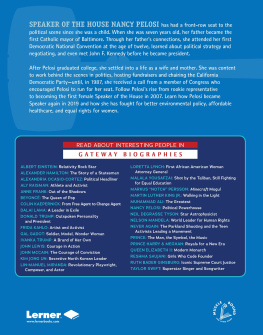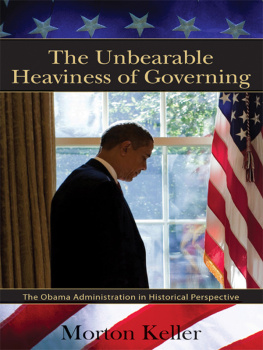Contents
Arc of Power
Arc of Power
INSIDE NANCY PELOSIS SPEAKERSHIP,
2005 2010
JOHN A. LAWRENCE

university press of kansas
2023 by the University Press of Kansas
All rights reserved
Published by the University Press of Kansas (Lawrence, Kansas 66045 ), which was organized by the Kansas Board of Regents and is operated and funded by Emporia State University, Fort Hays State University, Kansas State University, Pittsburg State University, the University of Kansas, and Wichita State University.
Library of Congress Cataloging-in-Publication Data
Names: Lawrence, John A., 1949 author.
Title: Arc of power: inside Nancy Pelosis speakership, 2005 2010 /
John A. Lawrence.
Description: Lawrence, Kansas: University Press of Kansas, 2022 . |
Includes bibliographical references and index.
Identifiers: LCCN 2022007577
ISBN 9780700633791 (cloth)
ISBN 9780700633814 (ebook)
Subjects: LCSH: Pelosi, Nancy, 1940 | United States. Congress.
HouseSpeakers. | Political cultureUnited States. | United StatesPolitics and government 2001 2009 . | United StatesPolitics and government 2009 2017 . | BISAC: BIOGRAPHY & AUTOBIOGRAPHY / Political | POLITICAL SCIENCE / American Government / Legislative Branch Classification: LCC E..P L 2022 | DDC ./
[B]dc/eng/ 20220719
LC record available at https://lccn.loc.gov/ 2022007577 .
British Library Cataloguing-in-Publication Data is available.
Printed in the United States of America
The paper used in the print publication is acid free and meets the minimum requirements of the American National Standard for Permanence of Paper for Printed Library Materials Z. 1992 .
Contents
Dedication and Acknowledgments
This book is dedicated to the men and women who serve as staff in the House and Senate.
Intelligent, committed, anonymous, loyal, driven, underpaid, and perennially exhausted, they play an invaluable role in the operation of our Congress and the preservation of our government. The best representative or senator would be hard-pressed to function without them and disingenuous to minimize their dedication, skill, and contributions. Throughout this book, I generally avoid referencing their names out of consideration for their privacy and confidentiality, but their expertise is found in every policy and strategy described in this account.
I also dedicate this book to my wife, Deborah Phillips, professor of psychology at Georgetown University, whose many sacrifices that allowed me to pursue a career in the House of Representatives are matched only by her encouragement of my subsequent academic endeavors, including the writing of this book.
I would like to acknowledge David Congdon of the University Press of Kansas for his steady support for this project and my agent, Lauren Sharp of Aevitas Creative Management, for her valued assistance with my publishing efforts. I am grateful to faculty colleagues at the University of California Washington Center, fellow scholars and other students of the Congress, the staff of the Library of Congress Manuscript Division, and colleagues from my years on Capitol Hillmembers and staff alikewhose insights, recollections, and encouragement have contributed greatly to the production of this book.
Introduction
Winning is good, Speaker of the House Nancy Pelosi has observed. Are you talking about the [San Francisco] Warriors or politics? a reporter followed up. Anywhere, she responded. Its always preferable.
This book is a unique examination of the winning, the exercise, and the loss of political power by congressional Democrats in a crisis-ridden but highly productive period: the last two years of the Bush presidency and the first two of the Obama era. In a nation as large, complex, and divided along partisan lines as the contemporary United States, the struggle to secure a congressional majority requires a deft combination of strategic planning, party discipline, and luck provided by uncontrollable events.
Utilizing that power is just as complicated, whether during periods of divided government as in 2007 or, as was the case in 2009 , with one party comfortably in control of the legislative and executive branches. As the history of this period demonstrates, the successful exercise of power often results in political decisions that can destabilize that very power and or destroy it altogether. Majorities, alliances, and agreements are ephemeral and can change after a protracted election campaign or a day of unanticipated events. It is why Washington, DC, is a perishable city, as Nancy Pelosi is fond of observing.
This arc of powerthe gaining, exercise, and loss of political poweris the subject this book documents: the issues, institutions, and personalities that clash and collaborate in the wielding of power during a turbulent five-year period. The major actors are the key political leaders in the House, Senate, and White House. The issues that consume their energies range from matters of war to health care, from economic crisis to political corruption.
This book admits the reader to a unique degree into the conversations, friendships, animosities, rivalries, and confrontations: the meetings and negotiations that produce the policies that are the focus of most political histories. Readers will come to appreciate the sheer number and miscellany of issues that demand the attention of political leaders and underlay the unrelenting pressures that are ever present in the policy-making process.
As a trained historian and Capitol Hill veteran of over thirty years, I was uniquely situated for eight years as the chief of staff to Nancy Pelosi both as Speaker and minority leader, a participant in hundreds of conversations that would otherwise be undocumented or only recalled days or years after they occurred. Serving as a major source for this account are nearly nine thousand pages of contemporaneous handwritten notes I took during my eight years as Pelosis chief of staff. These notes, together with other papers, are deposited in the Manuscript Division of the Library of Congress. Along with my transcriptions of much of this material, these notes will be available in the future to researchers. It is important to note that these accounts were not recalled after the fact but recorded in real time, as participants were speaking, and thus reflect the most accurate version of these interactions ever likely to become available.
All of the quotations attributed to individuals are derived from my notes, and most are referenced here in footnotes. On occasion, I have not attributed quotations to a specific person due to considerations of anonymity. And while some of the language quoted might strike some readers as unusually frank, I have declined to use many quotations that would have marketability only for their shock value. My goal is not to produce ephemeral headlines of who said what to whom, but rather to help readers understand the complex personal, institutional, and political relationships among the men and women who determine the political course of this nation.
This book is not intended to serve as a complete history of the Pelosi speakership (which resumed in 2019 ) nor as a biography of the first woman to lead the legislative branch of the government. It is rather a history of this time during which she, among others included in this story, played a determinative role by their actions involving both foreign and domestic issues of the highest magnitude. Despite my best efforts to maintain the dispassionate distance from my subject that historians strive to achieve, this work inevitably reflects perspectives attributable to my years on Capitol Hill and my perspective in experiencing these events from the viewpoint of the House of Representatives. Other accounts will analyze these events from alternative viewpoints and may draw different conclusions. Similarly, while I admit my admiration for Mrs. Pelosis devotion to the Congress and her consummate parliamentary skills, this book is not intended to serve as an homage or an apologia. Where I believe her decisions merit critical evaluation, I have not hesitated to offer it.









